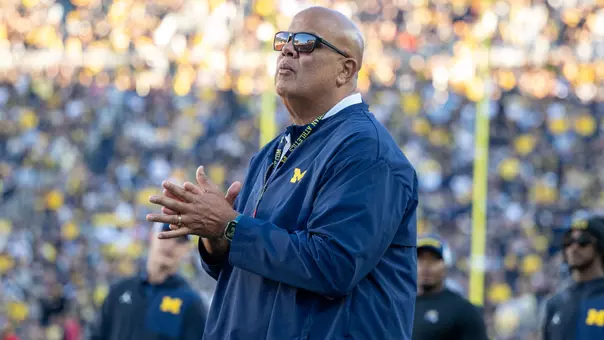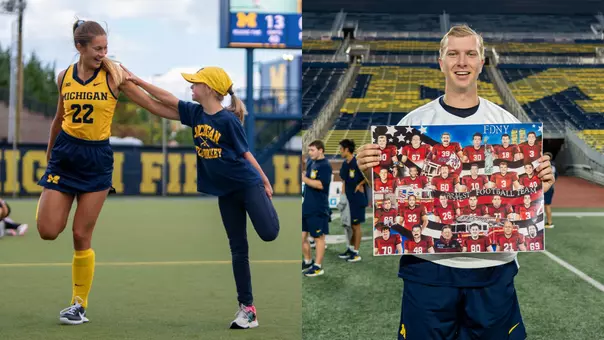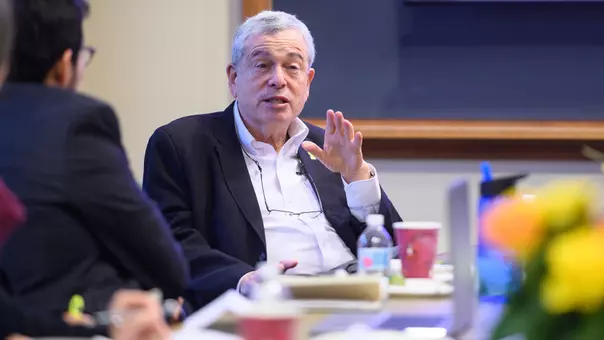Messages of Hope: Doing Something to Stop Student Suicide
9/18/2017 12:15:00 PM | General, Features
By Steve Kornacki
ANN ARBOR, Mich. -- Garrick Roemer used to love running on the track at the University of Michigan's iconic Ferry Field and walking across the service street to the Ross Academic Center. He ran the hurdles and was on a sprint relay for the Wolverines, and he was living a dream as a kid who grew up just a few miles south of campus in Saline.
Then, on May 4, 2014, his life and all of those dreams ended. Roemer, still four months away from his 20th birthday, died by suicide.
Sorrow came so suddenly for his family, friends and teammates. Grief pervaded the campus and his hometown. Over time, his family received heartfelt compassion and heard so many positive stories about Garrick from countless people, many of whom they'd never spoken with before, that it drove them to do something that could make a difference where suicide is concerned.
"Garrick liked people to be connected," said his mother, Cathy Radovich. "One of his teammates said he was the glue that connected people. And the people that I've connected with since his death are really because of Garrick. He is bringing me to all of these other people that I'm meeting and helping.
"So, he's still helping people. But it's just through me. If I can honor him that way, that's what I will do."
She and other family members, including Garrick's father, Ronald Roemer, have funded something that they hope not only carries on Garrick's loving, compassionate spirit but also provides solace and resources for those considering suicide. Their Messages of Hope board was officially unveiled Friday (Sept. 15), in the middle of National Suicide Awareness Month, along the main corridor of the Ross Academic Center.
Wolverines athletic director Warde Manuel addressed the gathering of well over 100 and said that while it was a "celebration" of Garrick and the Messages of Hope board, as well as a time to share thoughts, it was more than that, too.
"It really is a time for us to wake up to the fact that this is an issue -- that people need help," said Manuel, who has a social work background.
He noted data detailing a 24 percent increase in suicide over the last 15 years and added that a golfer who was at Michigan while Manuel was playing football and participating in track and field 30 years ago recently committed suicide.
Afterward, I asked Manuel what made this topic so personal and special to him.
"We often talk about being a family," Manuel said of the athletic department. "And because we are a family, we care. And we have family members in our midst in athletics who need our love and support and who are considering and thinking about suicide more than we know.
"And we have to remain diligent to prevent. I wasn't here when Garrick was, but I just had to opportunity to meet his mom, and it still touches me today as if I had been here because he's a student-athlete who walked these halls at Michigan and in Michigan athletics. It's a loss that -- whatever we can do to prevent (another) -- if this Messages of Hope board prevents one, then it's doing everything we're asking it to do."

A message inscribed on the wood plank above the board reads:
do something: Stop Student Suicide
we can all change the story
That same wording is inscribed on the five-by-five-inch wooden tiles offered to student-athletes in a box attached to the wall next to the board. Positive, encouraging messages have been written on more than 100 tiles and hung on the board.
Radovich visited it recently and saw signs of encouragement on a tile someone had inscribed with a message of hope: "Someone Needs You Tomorrow, Be Here for Them"
"It touched my heart," she said. "I know Garrick had pain, but he had so much to offer."
Radovich took that tile to help her think about the importance of reaching out whenever an opportunity arises.
The board is there in memory of her son so that others contemplating taking their lives might have many more years of happy memories in store.
And there's a huge need in that regard. According to research data from the Substance Abuse and Mental Health Services Administration, suicide is the second-leading cause of death in the U.S. among those ages 15-24, and 9.8 million adults had serious thoughts of committing suicide last year.
"I'm so excited about this board," said Emily Klueh, a clinical and mental health counselor in the athletic department who was an All-America and national champion swimmer for the Wolverines under her maiden name, Brunemann. "I've been working closely with CAPS (the University's Counseling and Psychological Services) on it, and it's such a great initiative. It builds community, and it shows that we care about student-athlete mental health. It's an interactive board.
"It's not only a resource for suicide prevention but those who might be struggling with a bad day or a bad practice, anything that can add stress and affect mental health. These little tiles may turn that around, and talking about it is changing the story. We're no longer living in silence."
The idea for the board came to Radovich after she exited the offices of Michigan's CAPS program, which has initiated a campus-wide initiative: "Stop Student Suicide -- We Can All Change The Story." It was only days after Garrick's death, but she was almost immediately thinking about finding a way to help others who felt the life-draining anguish her son felt.
"I met with [counselors] there soon after Garrick's death," said Radovich. "I noticed a wall outside of their office and thought about what a wonderful idea it would be to help with student suicide by having the young folks tell each other how important they are and that suicide's not really the answer.
"It really touched me that very first time, and I was thinking of what to do with some of the funds we raised for Garrick. I thought of how nice that board in the academic area where Garrick often spent time would be. He lived right across the street from the (Ross) Academic Center and had track at the track right there next to it.
"So, I thought it would be nice to have that board in honor of Garrick there to remind people and the young folks that as much as they have talent and drive, that there are still outside pressures that can get to them, and that they can help each other out with a message."
Radovich said she can't thank CAPs director Todd Sevig and the athletic department enough for working with her on the vision to put dialogue on suicide out in the open for all student-athletes to share.
That way, they can help change those stories that are headed toward tragic endings.
Radovich continued: "There are all those times now when I can't reach out to him, and I just know that he'd want to be there for me. If there's anything he regrets right now, I'm sure he regrets not being able to be there for his family and his siblings.
"The choice he made was something he made because of a (mental) illness and because he needed the pain to end -- not because he didn't want to be with us. And that's tough. At this age, these kids don't realize that it gets better. It might take a lot of work. But these kids at Michigan know about work, right?
"They rely on their academic and athletic talents but also have to cultivate the talent that they might have deep within to use for mental health. Having the openness to talk about it on campus a little more will help it be a not-so-scary topic so they can approach their coaches, talk to teammates and support each other."
Those tiles with hope written on them could be the first step in that regard.
"It will speak to the ones that need it," said Radovich.
Another emphasis is taking time to spend quality time with others, which his mother said was something Garrick loved doing.
"He really did have a way of knowing when people needed someone," said his mother. "He made you feel like you had a best friend. If Garrick saw you sitting apart from the team, he would pull you in and make you a part of it, and made comments to one teammate that if you see somebody (struggling), just talk to them. You never know what their story is."
Unless you ask.
Suicide is a very difficult topic for those contemplating it to share with anyone, but his mother said family and friends need to go there.
"Gosh, it's hard," said Radovich. "If you witness someone that's in pain or maybe isn't acting like themselves -- whether it be taking risky behaviors or drinking a lot more -- just not taking care of themselves or their body, their grades slip ... have that conversation: 'Hey, what's going on? How can I help you? Maybe we should go talk to [counselors].'
"Just be honest and reflect if you've had those struggles, too. You can ask them, 'Are you thinking about suicide?' "
Klueh said that discussion is central to the approach of the Athletes Connected program she coordinates for Wolverines student-athletes, adding:
"Destigmatizing that idea of toughing it out, where student-athletes are constantly taught that they have to push through pain to be better. I think a lot of people have internalized that in their mental health as well, but now we are saying that you don't have to 'tough' this out. There are resources available and people to support you to be the best you can be."

Sevig (left) and Radovich
Connecting athletes to one another can lead to the proper solutions to dealing with trying personal situations, and Garrick, according to his mother, held much of his trouble inside.
"He definitely was affected by mental health issues," said Radovich. "One thing I think about is that the only person who could've saved Garrick is Garrick. He was seeing a therapist and didn't tell his therapist he was thinking about suicide. Had he, maybe the difference would be that he would still be here. It's not normal to think about suicide, and if you are thinking about a plan or made attempts, then there is something wrong and it can be fixed. It's a brain disorder.
"We can't save everybody, but we can help everybody know how to help save themselves. We have to elevate it and make it not taboo and just get it out there and make a difference."
The collaboration between Performance Psychology Athletic Counseling (PPAC) and CAPS is a big step in the right direction.
Radovich said other Messages of Hope boards will be placed around the university to spread the impact of compassion on campus. Another board already is located at the Michigan Union next to the CAPS office.
Available next to the boards are laminated resource sheets discussing suicide prevention and warning signs. Contact information for help is provided. The University of Michigan's Psychiatric Emergency Services 24-hour crisis line is (734) 996-4747.
A plaque remembering Garrick was placed near the Messages of Hope board, a reminder of the student, athlete, friend, sibling and son who inspired it. Sevig presented Radovich a duplicate plaque for the family, and she smiled a mother's proud smile when looking down at it in her hands.
The photo on the plaque shows Garrick turning the corner on the track with a relay baton in his right hand, and his accomplishments, such as placing 17th in the 400-meter hurdles at the Big Ten Outdoor Championships as a freshman, are listed.
A quote from Garrick is at the bottom of the plaque:
"Talk to everyone. No matter how unlike you they appear, just talk to everyone. Everyone has something to say."










